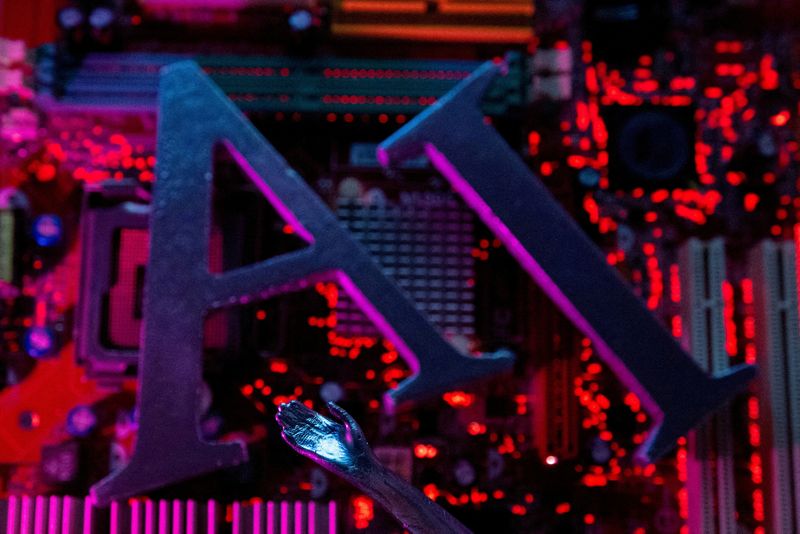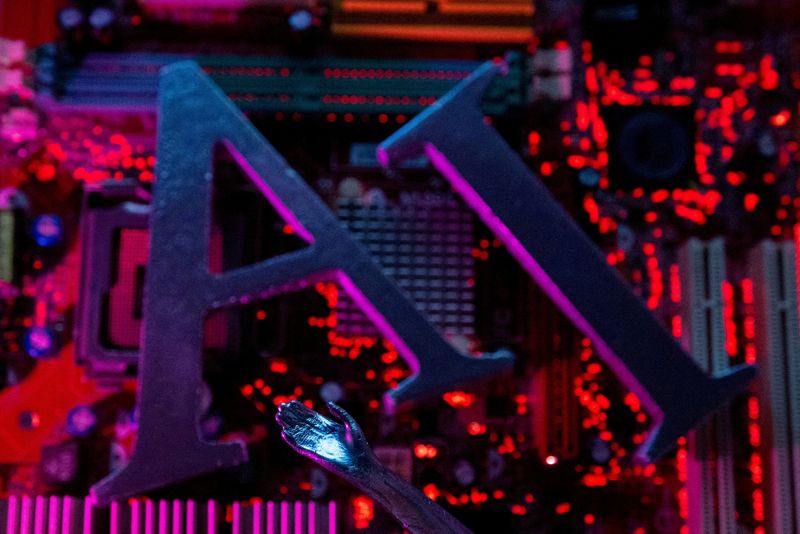Stock Markets
US prosecutors see rising threat of AI-generated child sex abuse imagery

(This Oct. 17 story has been refiled to change James Silver’s title to deputy chief in paragraph 3)
By Andrew Goudsward
WASHINGTON (Reuters) – U.S. federal prosecutors are stepping up their pursuit of suspects who use artificial intelligence tools to manipulate or create child sex abuse images, as law enforcement fears the technology could spur a flood of illicit material.
The U.S. Justice Department has brought two criminal cases this year against defendants accused of using generative AI systems, which create text or images in response to user prompts, to produce explicit images of children.
“There’s more to come,” said James Silver, the deputy chief of the Justice Department’s Computer Crime and Intellectual Property Section, predicting further similar cases.
“What we’re concerned about is the normalization of this,” Silver said in an interview. “AI makes it easier to generate these kinds of images, and the more that are out there, the more normalized this becomes. That’s something that we really want to stymie and get in front of.”
The rise of generative AI has sparked concerns at the Justice Department that the rapidly advancing technology will be used to carry out cyberattacks, boost the sophistication of cryptocurrency scammers and undermine election security.
Child sex abuse cases mark some of the first times that prosecutors are trying to apply existing U.S. laws to alleged crimes involving AI, and even successful convictions could face appeals as courts weigh how the new technology may alter the legal landscape around child exploitation.
Prosecutors and child safety advocates say generative AI systems can allow offenders to morph and sexualize ordinary photos of children and warn that a proliferation of AI-produced material will make it harder for law enforcement to identify and locate real victims of abuse.
The National Center for Missing and Exploited Children, a nonprofit group that collects tips about online child exploitation, receives an average of about 450 reports each month related to generative AI, according to Yiota Souras, the group’s chief legal officer.
That’s a fraction of the average of 3 million monthly reports of overall online child exploitation the group received last year.
UNTESTED GROUND
Cases involving AI-generated sex abuse imagery are likely to tread new legal ground, particularly when an identifiable child is not depicted.
Silver said in those instances, prosecutors in the Justice Department’s child exploitation section can charge obscenity offenses when child pornography laws do not apply.
Prosecutors indicted Steven Anderegg, a software engineer from Wisconsin, in May on charges including transferring obscene material. Anderegg is accused of using Stable Diffusion, a popular text-to-image AI model, to generate images of young children engaged in sexually explicit conduct and sharing some of those images with a 15-year-old boy, according to court documents.
Anderegg has pleaded not guilty and is seeking to dismiss the charges by arguing that they violate his rights under the U.S. Constitution, court documents show.
He has been released from custody while awaiting trial. His attorney was not available for comment.
Stability AI, the maker of Stable Diffusion, said the case involved a version of the AI model that was released before the company took over the development of Stable Diffusion. The company said it has made investments to prevent “the misuse of AI for the production of harmful content.”
Federal prosecutors also charged a U.S. Army soldier with child pornography offenses in part for allegedly using AI chatbots to morph innocent photos of children he knew to generate violent sexual abuse imagery, court documents show.
The defendant, Seth Herrera, pleaded not guilty and has been ordered held in jail to await trial. Herrera’s lawyer did not respond to a request for comment.
Legal experts said that while sexually explicit depictions of actual children are covered under child pornography laws, the landscape around obscenity and purely AI-generated imagery is less clear.
The U.S. Supreme Court in 2002 struck down as unconstitutional a federal law that criminalized any depiction, including computer-generated imagery, appearing to show minors engaged in sexual activity.
“These prosecutions will be hard if the government is relying on the moral repulsiveness alone to carry the day,” said Jane Bambauer, a law professor at the University of Florida who studies AI and its impact on privacy and law enforcement.
Federal prosecutors have secured convictions in recent years against defendants who possessed sexually explicit images of children that also qualified as obscene under the law.
Advocates are also focusing on preventing AI systems from generating abusive material.
Two nonprofit advocacy groups, Thorn and All Tech Is Human, secured commitments in April from some of the largest players in AI including Alphabet’s (NASDAQ:) Google, Amazon.com (NASDAQ:), Facebook and Instagram parent Meta Platforms (NASDAQ:), OpenAI and Stability AI to avoid training their models on child sex abuse imagery and to monitor their platforms to prevent its creation and spread.

“I don’t want to paint this as a future problem, because it’s not. It’s happening now,” said Rebecca Portnoff, Thorn’s vice president of data science.
“As far as whether it’s a future problem that will get completely out of control, I still have hope that we can act in this window of opportunity to prevent that.”
Stock Markets
Suburban Propane director Logan sells $139k in shares
Stock Markets
Stock market today: S&P 500 closes lower, but posts big weekly win
Stock Markets
TD Bank promotes Laura Nitti to retail market president role

 Forex3 years ago
Forex3 years agoForex Today: the dollar is gaining strength amid gloomy sentiment at the start of the Fed’s week

 Forex3 years ago
Forex3 years agoUnbiased review of Pocket Option broker

 Forex3 years ago
Forex3 years agoDollar to pound sterling exchange rate today: Pound plummeted to its lowest since 1985

 Forex3 years ago
Forex3 years agoHow is the Australian dollar doing today?

 Cryptocurrency3 years ago
Cryptocurrency3 years agoWhat happened in the crypto market – current events today

 World3 years ago
World3 years agoWhy are modern video games an art form?

 Commodities3 years ago
Commodities3 years agoCopper continues to fall in price on expectations of lower demand in China

 Economy3 years ago
Economy3 years agoCrude oil tankers double in price due to EU anti-Russian sanctions





















